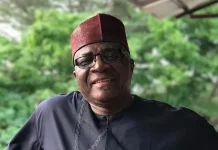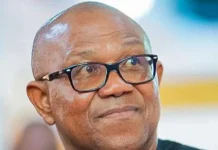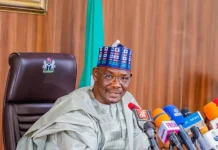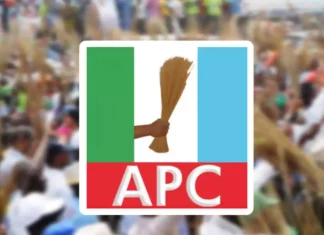The opposition block’s northern leaders are rethinking their plans and leading the charge to create a new mega coalition political party that will represent the region’s and its citizens’ interests in the general elections of 2027.
Following Sunday’s National Political Consultative Group (NPCG) meeting in Abuja, the Northern opposition bloc said in a statement that the new massive political party’s name would be revealed shortly.
According to the document, which was signed by Babachir Lawal, the former Secretary to the Government of the Federation (SGF) and current Chairman of the NPCG, representatives from all 19 federation states and Abuja decided that the North must act as a single unit when making a political decision in order to guarantee the region receives the most benefit from national political participation.
In addition to increasing unemployment and destitution throughout the northern region, the meeting voiced grave concerns about the region’s deteriorating security situation, which it claimed has also increased poverty, resulted in the loss of many lives and property valued at millions of naira.
According to the statement, widespread poverty, starvation, destitution, and the breakdown of basic and secondary education are all results of the current administration’s unprecedented levels of instability.
The region, and the country, need selfless leaders who will be honest in managing political parties and governing the public sector, the gathering underlined.
Additionally, participants “condemned the impunity of elected leaders who exploit the mandate of the people by claiming to make decisions for their constituents without consulting them, citing recent developments in which elected state governors and legislators usurp the power of the people by endorsing themselves and other individuals for re-election to political offices without consulting their constituents, and advised that constituents should sanction such elected officials to serve as a deterrent.”
According to the press release, the participants “agreed on the need to escalate the group’s initiative to all the nineteen (19) states and FCT through the provision of the appropriate template and resolved that the region must prioritize and promote industrialization and high productivity in all sectors in order to exit the present economic quagmire.”
Regardless of the candidate’s place of origin, the group also decided that the North would only back candidates who have an enforceable agreement in order to safeguard and protect the region’s interests.
“That, going forward, the North must prescribe its support for candidates at elections on enforceable agreement for the purpose of ensuring and protecting the informed interests of the region, regardless of where the candidates come from,” the communique went on.
In order to help implement the choices and resolutions made during the meeting, the committees were eventually established.
The APC National Working Committee, the Progressive Governors Forum, and the party’s National Assembly members recently endorsed President Bola Ahmed Tinubu for the 2027 presidential race. The Peoples Redemption Party (PRP) strongly denounced this decision, calling it extremely troubling for democracy, during the APC National Summit on Thursday.
Signed by Mallam Falalu Bello, OFR, its National Chairman, the message was released over the weekend.
The endorsements, according to the People’s Redemption Party (PRP), were motivated more by desperation than by true democratic desire and “expose the APC’s attempt to cling to power through orchestrated endorsements rather than the genuine voice of the Nigerian people.”
Power is maintained by the confidence and belief of the populace, not just by strategies, as history and contemporary political realities teach us. The loss of public trust causes even the most powerful governmental apparatus to collapse, as demonstrated by examples from around the world.
Read Also: Kalu Acknowledges Nigerians’ Struggles, Predicts Improvement in 2–3 Years
In the 2010 election in Ivory Coast, for instance, the PRP remembered that “President Laurent Gbagbo sought to cling to power, armed with resources, state structures, and fake endorsements like President Tinubu.” However, the electorate eventually rejected him. Their choice sprang from their shared experience of hunger, poverty, and financial distress.
Hunger never forgets, as the Ivorian’s rejection showed, and no amount of propaganda or political machinery can take the place of a suffering people’s voice. Edgar Lungu’s control over the media, state apparatus, and finances was also insufficient in Zambia, where he was overthrown by a young opposition candidate named Hakainde Hichilema. Hichilema turned people’s resentment into votes and ultimately altered the political landscape, demonstrating that people vote based on their suffering rather than party affiliation.
“Power is fragile when the public loses faith in its effectiveness and legitimacy, even when it is supported by the best institutions. This notion is further highlighted by the Gambia instance of Yahya Jammeh. He tried to govern for “a billion years,” but in the end, the will of the people won out, and even his devoted army retreated when the vote overrode propaganda.
When power is founded on the trust of the people, it is strong; when it is founded on desperation and manipulation, it is weak. In other words, when people lose faith in their leaders, even the most complex plans become meaningless, defections become theatrical, endorsements become humorous, and power eventually disappears.
“(President) Tinubu’s political machinery and endorsements may seem formidable now, but they cannot silence the cries of the masses dealing with skyrocketing fuel prices, failing infrastructure, joblessness, insecurity, brazen corruption, and a collapsing economy,” the PRP said, adding that Nigeria’s situation echoes this truth.
“There is a noticeable disenchantment among the populace, and when people mutter, ‘This is not what we voted for,’ it indicates a serious problem between the governed and the leadership. Furthermore, rather than being merely endorsements or political alliances, the aforementioned indices are the actual votes that will decide the future.
The PRP went on to say, “The APC’s current decision to support Tinubu’s candidacy seems to be a classic example of a desperate power grab—an attempt to cement dominance through political theater and endorsements rather than delivery of genuine democratic dividends.” The people’s voice—their suffering and aspirations—remains the final judge of actual power, regardless of how crowded or practiced the political stage gets, as history and contemporary reality demonstrate.
The PRP urged the APC and President Bola Tinubu to understand that democracy is about providing the people with real services, security, and dignity, not only about supporting candidates or party apparatus. Desperate attempts to subvert this basic concept are bound to result in failure.
“We support the Nigerian people in their demand for genuine change rather than a power grab.” Power must be based on the confidence of the people, not on the desperate attempts of those who want to maintain it at any costs. The future belongs to those who recognize this, the statement said.
Join Television Nigerian Whatsapp Now
Join Television Nigerian Facebook Now
Join Television Nigerian Twitter Now
Join Television Nigerian YouTUbe Now





